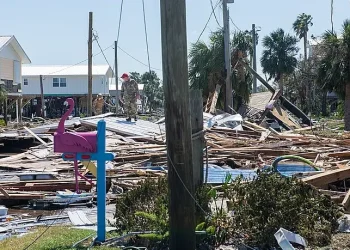The U.S. Department of Homeland Security (DHS) has announced the allocation of over $12 million in FEMA grants to aid North Carolina’s recovery from Tropical Storm Helene, emphasizing swift federal action under the Trump administration to repair critical infrastructure and enhance community resilience.
In a significant move to bolster disaster recovery efforts, the DHS has disbursed over $12 million in FEMA grants to North Carolina. This funding is part of a broader $322 million commitment aimed at repairing roads, public facilities, electrical systems, and schools affected by Tropical Storm Helene.
The initiative underscores the Trump administration’s focus on reducing bureaucratic delays and prioritizing American communities’ recovery needs.
Infrastructure Restoration Efforts
The grants are directed towards various critical infrastructure projects across North Carolina. The North Carolina Department of Transportation received $65.2 million for road repairs in several counties, while the Town of Beech Mountain was allocated $5.8 million for road restoration. Additionally, EnergyUnited Electric Membership Corporation was granted $2.4 million for emergency electrical system repairs.
Community Support Initiatives
- $5.9 million allocated to restore Chimney Rock State Park’s infrastructure.
- $1.5 million provided for Asheville Christian Academy’s building remediation.
- $1.4 million designated for public facility repairs in Old Fort.
- $1 million earmarked for debris removal in Haywood County.
Disbursement Breakdown
Since July 14, more than $161 million in FEMA funding has been reimbursed, including large allocations such as:
-
-
$65.2 million for transportation repairs in Buncombe, McDowell, Mitchell, Wilkes, and Yancey counties.
-
$5.9 million for restoration of Chimney Rock State Park’s roads, bridge, and café.
-
$5.8 million for Beech Mountain’s road and charter repairs.
-
$2.4 million for EnergyUnited Electric Membership Corporation to protect local power distribution.
-
$1.5 million for flood remediation at Asheville Christian Academy.
-
$1.4 million for Old Fort’s permanent facility repairs.
-
$1 million for Haywood County’s massive debris removal operation (over 1.3 million cubic yards).
-
Context and Trends
-
Storm Impact: Tropical Storm Helene caused extensive flooding, infrastructure damage, and power outages in North Carolina, particularly affecting mountainous regions where road networks and public facilities suffered severe damage.
-
Historical Parallels: FEMA has historically distributed recovery funds following major hurricanes and tropical storms in North Carolina, such as Hurricane Florence in 2018 and Hurricane Matthew in 2016, with similar multipronged grant disbursements to restore infrastructure and community assets.
-
Recovery Pace & Bureaucratic Reform: The press release contrasts current rapid disbursement with delays seen during previous administrations. In past years, state and local officials frequently criticized federal bottlenecks that slowed down the release and application of emergency funds.
Human and Local Impact
-
Community Restoration: Funding is enabling rapid reopening of schools, parks, and local services, protecting vulnerable populations in rural and urban areas.
-
Economic and Social Significance:
-
The grants support thousands of workers involved in restoration projects, from construction to education and energy supply.
-
Counties receiving the largest grants (Buncombe, McDowell, Mitchell, Wilkes, Yancey) are noted for tourism, agriculture, and small business sectors, which are highly dependent on resilient infrastructure.
-
Haywood County’s debris removal project prevents environmental hazards and facilitates faster recovery of housing and public spaces.
-
Supplementary Historical Data
| Year | Major Storm | FEMA Recovery Commitment | Largest Grant Category | Notable Community Projects |
|---|---|---|---|---|
| 2025 | Helene | $322M | Road repairs ($65.2M) | School remediation, debris removal |
| 2018 | Florence | $1B+ | Housing repairs | Power restoration, water systems |
| 2016 | Matthew | $500M+ | Infrastructure rebuild | Park/cultural asset restoration |
Federal Commitment to Resilience
This funding initiative highlights the federal government’s commitment to enhancing national security by strengthening critical infrastructure against future natural disasters.
By restoring essential services and fortifying communities, these efforts support economic stability and demonstrate a streamlined approach to disaster response that aims to improve public trust and intergovernmental relations.
Additional Reading
Wrapping Up
The recent FEMA grant disbursements underscore a strategic effort by the U.S. government to prioritize disaster recovery and resilience in North Carolina following Tropical Storm Helene.
By addressing critical infrastructure needs swiftly, this initiative not only aids immediate recovery but also strengthens long-term community resilience against future challenges.
Sources: U.S. Department of Homeland Security, Federal Emergency Management Agency (FEMA), and North Carolina Department of Transportation.
Prepared by Ivan Alexander Golden, Founder of THX News™, an independent news organization delivering timely insights from global official sources. Combines AI-analyzed research with human-edited accuracy and context.







